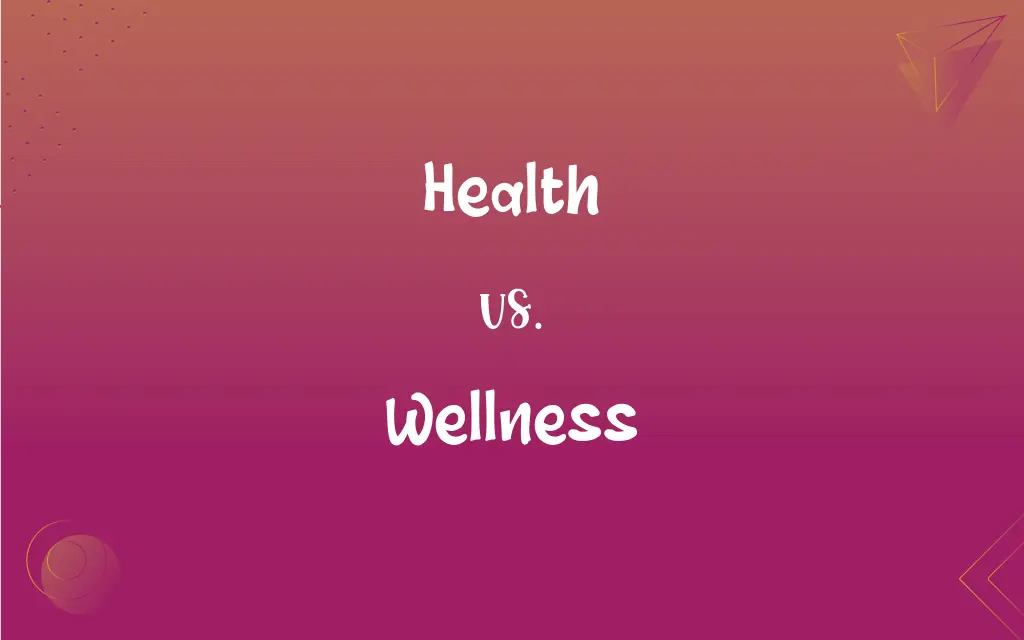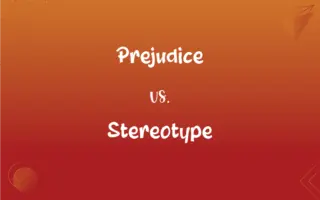Health vs. Wellness: What's the Difference?
Edited by Janet White || By Harlon Moss || Updated on October 13, 2023
Health involves overall physical, mental, and social well-being; wellness focuses on the practice of healthy habits to enhance well-being.

Key Differences
Health pertains to the state of being free from illness or injury; wellness integrates the awareness and conscious choice toward a fulfilling life.
Health typically emphasizes physical parameters such as disease status and bodily function; wellness encompasses physical, mental, and spiritual aspects of life.
Health often employs objective measures like blood pressure and weight; wellness might be more subjectively assessed through feelings of balance, vitality, and contentment.
Health might be described with a focus on ailments or the absence thereof; wellness seeks optimal living, considering a person’s emotional, environmental, and occupational spheres.
Health can sometimes be seen as binary, where you are either healthy or not; wellness usually operates on a continuum, moving towards greater wellbeing or away from it.
ADVERTISEMENT
Comparison Chart
Focus
State of physical, mental, social well-being
Active pursuit of practices enhancing well-being
Spectrum
Often binary: healthy or not
Continuum, from poor to optimal wellness
Aspects Covered
Physical, mental, and social aspects
Physical, mental, spiritual, emotional, etc.
Dependency
Can be influenced by external factors
Largely depends on individual choices
Interactivity with Life
Can be passive (e.g., not being sick)
Active engagement in health-improving behaviors
ADVERTISEMENT
Health and Wellness Definitions
Health
A state of complete physical, mental, and social well-being.
His vibrant energy is a sign of good health.
Wellness
The quality or state of being healthy in body and mind, especially as the result of deliberate effort.
Personal wellness can be improved by adequate sleep, a nutritious diet, and regular exercise.
Health
Condition in which the body’s systems function efficiently.
Without health, we cannot enjoy life to the fullest.
Wellness
The active pursuit of activities, choices, and lifestyles that lead to a state of holistic health.
Yoga contributes to my physical and mental wellness.
Health
The level of functional or metabolic efficiency of an organism.
A balanced diet is vital for good health.
Wellness
The state of being in good health, especially as an actively pursued goal.
Wellness retreats offer a break from routine and a chance to rejuvenate.
Health
Absence of disease or infirmity.
Regular exercise can contribute to maintaining health.
Wellness
A conscious, self-directed, and evolving process of achieving full potential.
Mental wellness is as important as physical wellness.
Health
The general condition of the body or mind.
Stress can have a significant impact on health.
Wellness
An active process of becoming aware of and making choices toward a healthy and fulfilling life.
Through wellness programs, companies support employees’ healthy choices.
Health
The overall condition of an organism at a given time.
Wellness
The condition of good physical and mental health, especially when actively maintained by proper diet, exercise, and avoidance of risky behavior.
Health
Soundness, especially of body or mind; freedom from disease or abnormality.
Wellness
The quality or state of being in good health.
Wellness
The process of learning about and engaging in behaviors that are likely to result in optimal health.
Wellness
A healthy state of wellbeing free from disease;
Physicians should be held responsible for the health of their patients
FAQs
What does "health" refer to?
"Health" refers to the overall condition of the body or mind, especially in terms of the presence or absence of illnesses.
What is the plural of "health"?
"Health" is an uncountable noun and does not have a plural form.
Can "health" be used as an adjective?
No, but “healthy” is the adjective form.
Is "health" synonymous with "fitness"?
No, "fitness" specifically refers to physical capabilities, while "health" encompasses overall well-being.
How do you use "health" in a sentence?
"Good nutrition is crucial for maintaining optimal health."
What is "public health"?
"Public health" refers to the health and well-being of the general population and involves organized efforts to prevent disease and promote health.
Can "health" be modified with adjectives?
Yes, e.g., "optimal health," "poor health," "mental health."
Is "health" a noun?
Yes, "health" is a noun.
Can "wellness" be used as an adjective?
No, but "well" can be used adjectivally as in "well child" or "well patient."
Can "wellness" refer to emotional health?
Yes, "wellness" encompasses physical, mental, and emotional health.
How to use "wellness" in a sentence?
Example: "The spa promotes a path toward wellness through various therapies."
What is a "wellness program"?
A "wellness program" is a structured plan or initiative aimed at promoting healthy lifestyles, often within an organizational context.
Can "wellness" be used in a corporate context?
Yes, companies often use "wellness" in the context of programs aimed at supporting employees' health.
Is "wellness" related to "wholeness"?
While both convey completeness and soundness, "wellness" is specifically about health, while "wholeness" might denote comprehensive integrity or undivided completeness.
Can "health" refer to mental condition?
Yes, "health" can refer to both mental and physical conditions.
What’s an antonym for "health"?
An antonym for "health" could be "illness" or "disease."
What does "wellness" mean?
"Wellness" refers to the state or condition of being in good physical and mental health.
Is "wellness" a countable or uncountable noun?
"Wellness" is an uncountable noun.
What is the origin of "wellness"?
"Wellness" originates from the word "well," which is from the Old English "wel."
Are "wellness" and "wellbeing" interchangeable?
While similar, "wellness" often refers to active pursuit of health, while "wellbeing" is a broader term that can denote overall quality of life.
About Author
Written by
Harlon MossHarlon is a seasoned quality moderator and accomplished content writer for Difference Wiki. An alumnus of the prestigious University of California, he earned his degree in Computer Science. Leveraging his academic background, Harlon brings a meticulous and informed perspective to his work, ensuring content accuracy and excellence.
Edited by
Janet WhiteJanet White has been an esteemed writer and blogger for Difference Wiki. Holding a Master's degree in Science and Medical Journalism from the prestigious Boston University, she has consistently demonstrated her expertise and passion for her field. When she's not immersed in her work, Janet relishes her time exercising, delving into a good book, and cherishing moments with friends and family.
































































